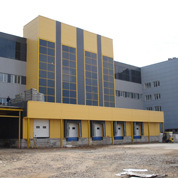The Russian IT and telecom services market through the eye of an industry expert

Brief review of the Russian IT and telecom services market today
For certain, the current condition on the Russian IT and telecom market depends on the current crisis and its impacts on the economy. Indeed, certain trends have now become very obvious. Firstly, the operators, who have built their business on external borrowing, now have to settle their debts from profits. This fact, along with the reduction in sales revenues, is forcing them to engage in cost reductions, write-offs of problematic debts, restructuring of payments, elimination of superfluous, auxiliary and costly business activities, postponement or outright annulment of their IPO plans, etc.
Obviously, one of the consequences of these processes is the significant increase in the number of mergers and acquisitions transactions, and even bankruptcies, of several companies. Such trends are evident among mobile and fixed communications services operators and providers of IT equipment and services. These, for instance, include the mergers of such companies as VimpelCom and Golden Telecom, Euroset and VTB VimpelCom, the MTS acquisition of Telefon.ru and El Dorado chain of telecom stores, Synterra’s acquisition of MTT, the ongoing negotiations between MegaFon and Dixis, SkyLink sale, etc.
Likewise, companies that depend on their internal financial resources for development are involved in similar processes, but, in addition, they are able to boost their resources not only to expand their businesses in conditions of falling prices, but also to offer new products and services. There is a marked reduction in companies’ market capitalization, revenues and volumes of services and goods. According to industry experts’ data, capitalization of telecoms companies has fallen by 20%-60%, while sales computer equipment, already down by 15%-20%, could drop further by up to 40% in 2009. 
IT services integrators are offering electronic technologies and business management software programs — such as the ERM, CRM and OSS/BSS, etc — that help control company’s operations, boost security measures, including the prevention of unauthorized access to classified corporate data. In this context, huge attention is being paid to the procurement of such services as data processing and storage centers (Datacenters) via outsourcing, a very popular in the media. Some very interesting data published by IT research firm J’son&Partners will help illustrate this trend. Thus, according to J’son&Partners, this sector grew 60% in 2008, generating a total revenue of $160mln, while the total area of Datacenters was 21,000sqm, a figure, which in my humble opinion, is highly conservative. More importantly, J’son&Partners listed Linxtelecom Russia, comprising Linxtelecom CIS and Svyaz VSD, previously known as Widexs, among the market leaders. Therefore, one can conclude that operators and providers as well as IT services integrators and distributors, who have been affected by the global crisis, are taking vigorous measures to cut costs, restructure businesses, streamline management and introduce new products expected to generate huge demand at competitive prices. On the whole, after the Q1’ 2009, the Russian IT and telecoms market has retained its ability to respond swiftly to changing market situations, which is good news to service consumers, especially, in the corporate market segment.
Now, a few words about IT and telecom services consumers. Naturally, corporations in different market segments face the same problems as those confronting the IT and telecoms firms, and are, therefore, engaged in the same processes of optimizing expenditures and concentrating on their core businesses. Consequently, IT and telecom services are now being increasingly viewed from the point of view of companies’ expenditures, rather than as vital investments into corporations’ core business operations. We, as IT and telecom services providers, fully understand these processes, and this is why our major goal today is to help our customers both in their drives for more effective cost reductions as well as optimal business development.
How do you see your company in this sector of the Russian economy?
Regarding Linxtelecom’s activities in Russia, I can say that we operate on the corporate market segment and on the telecoms industry, the so-called ‘carrier carriers’ market. Our key services include the provision of transit and access to the Internet, the formation of virtual nodes and corporate networks based on different protocols, for instance, the MPLS and Ethernet, as well as provision of dedicated channels and local telephony services. For this purpose, we employ our own cable networks, including subsea cables in the Baltic Sea as well as capacities leased from different operators in Russia. Particularly, I would like to note our top-quality Datacenter services in Moscow, St. Petersburg and Tallinn. Our parent holding, Linxtelecom BV, a Netherlands-based company, has specially acquired Svyaz VSD, previously known in Russia as Widexs, and currently operating under the Linxtelecom common trademark, to develop and offer such services in this country. Our Datacenter in Moscow, one of the best-known in the country, as it enjoys the trust of both foreign and Russian corporations, features a successful modular architectural concept that enables it provide high survivability and infrastructure readiness. It offers such services as equipment storage, hosting, provision of business continuity and disaster recovery after contingencies.
For this purpose, we employ our own cable networks, including subsea cables in the Baltic Sea as well as capacities leased from different operators in Russia. Particularly, I would like to note our top-quality Datacenter services in Moscow, St. Petersburg and Tallinn. Our parent holding, Linxtelecom BV, a Netherlands-based company, has specially acquired Svyaz VSD, previously known in Russia as Widexs, and currently operating under the Linxtelecom common trademark, to develop and offer such services in this country. Our Datacenter in Moscow, one of the best-known in the country, as it enjoys the trust of both foreign and Russian corporations, features a successful modular architectural concept that enables it provide high survivability and infrastructure readiness. It offers such services as equipment storage, hosting, provision of business continuity and disaster recovery after contingencies.
What can you say about the quality of services rendered by your company in this industry?
Independent experts consulting major banks and other corporations in Russia have audited our services more than once to ascertain their quality, and I can proudly say that we were the first company to pass such ‘maturity’ examinations with flying colors in Russia. Specifically, the quality level of our Moscow-based Datacenter complies with Tier No. 2-3 of the TIA international standards, has a capacity of 2,500sqm and powered by 2mw of electricity. Now, we are expanding the facility further again. A similar Datacenter will be commissioned in St. Petersburg later in the year. For this purpose, we have established representative offices in the city and hired a team of experts, while the actual construction works are being jointly executed with Skytrade, the owner of the building. The construction, under direct management of Linxtelecom BV, will be completed in Q3’2009. The project, which complies with the Tier No. 3 quality level on the TIA standard, will offer 5,000sqm space and expected to use 2 mw of electricity at the first stage, which be increased to 12mw at the final stage. The concept in St. Petersburg’s Datacenter is slightly different from that in Moscow due to differences in their building structures and electric power networks.
How do you see the company’s role and how does it impact on its clientele in Russia?
We see our role as providers of the latest, most advanced and cut-edge technological services in the IT and telecom sector. We are focused on the geographical information space between Russia and Europe in particular, and the rest of the world, in general, with Eastern Europe being our most attractive market target. We are highly rated in the region as one of the best providers of telecom services, a fact evident in the high number of Moscow telecom operators and providers that operates via our networks. Specially, we control about 10% of the Russian Datacenter services market. With regard to clientele, suffice it to say that major global banks and corporations, including Russian ones, from metallurgy, mass media, IT, telecom, energy, perfumery, etc are among our regular customers. And, judging by our current service orders, we expect the demand for our services to grow at higher rates in the future because the customer trust that we have earned over the past six years is at a very high level, and this makes more corporate sector clients use our resources more readily.
The Linxtelecom Group offers reduction of IT and telecom expenses as one of its marketing strategies. How is this implemented in practice, and how significant are such reductions vis-a-vis those of its direct competitors?
That declaration does not apply to the entire range of our IT and telecom services, but only to the ones that I have mentioned above.  This is because, as a telecom services provider, we have several options at our disposal. These, first of all, include our ability to increase the capacity of cable lines, and thus, reduce the cost per unit of services offered to clients. The second is the improvement of the quality and reliability of rendered services through the overall improvement of our servicing level. Third is increasing our Datacenter resources, and lastly, the fourth is the implementation of a ‘single invoice’ policy for our customers. The first three points are quite clear, and therefore, I will note only the following: our unique feature is our broad market geography. We are well equipped in these areas, and, therefore, can provide top-quality services at competitive prices. Our tactic envisages readiness to customize our services to customers’ orders and rapidly respond to their needs. And, to improve the overall quality and reliability of our services, we are overhauling our subsea cable lines, building new cable lines in new and different directions as well as improving the ring topology of our main networks.
This is because, as a telecom services provider, we have several options at our disposal. These, first of all, include our ability to increase the capacity of cable lines, and thus, reduce the cost per unit of services offered to clients. The second is the improvement of the quality and reliability of rendered services through the overall improvement of our servicing level. Third is increasing our Datacenter resources, and lastly, the fourth is the implementation of a ‘single invoice’ policy for our customers. The first three points are quite clear, and therefore, I will note only the following: our unique feature is our broad market geography. We are well equipped in these areas, and, therefore, can provide top-quality services at competitive prices. Our tactic envisages readiness to customize our services to customers’ orders and rapidly respond to their needs. And, to improve the overall quality and reliability of our services, we are overhauling our subsea cable lines, building new cable lines in new and different directions as well as improving the ring topology of our main networks.
There are many companies offering services similar to those offered by your company in Russia. What unique services does your company offer that really distinguish it from its key competitors?
First of all, I would like to note that we are among the top five players on the Russia Datacenter services market, with our exact positions varying from case-to-case basis, depending on the criteria used. One of these, for instance, is the availability of dedicated services ensuring business continuity, the second difference lies in our extensive geographic market coverage and the third is the presence of Svyaz VSD in our group that has an impressive track record of successful experience in operating the first professional Datacenter in Russia. However, our best and most important competitive advantage is the deep trust that we have won on the market, which is of paramount importance when offering the Datacenter services via outsourcing. On the other hand, speaking about other players outside the top five that frequently use the term ‘Datacenter' to describe their services, I would like to specifically note that such services, as a rule, do not comply with the international standards. More often, such companies use the term Datacenter to denote any server room in their disposal.
Still on the Datacenter services, how can you briefly describe the demand for them, their unique features and their overall prospects on the Russian market?
I have already cited the data published by J’son&Partners. I can cite them again, but this time to buttress the strong demand for the Datacenter services, which are robustly growing despite the current crisis, because of the following reasons: integration of Russia into the global economy, the growth in Internet traffic and resources, including the Runet segment, formulation of national and state projects, and of course, the serious attention being paid to the IT development by the both Russian president and the government. Judging by the volume of orders we have so far received, we can expect serious growth, up to 80%, in demand in 2009. Besides, the capabilities of other key market players are also growing as well. For example, Sitronics has declared its interest in mobile Datacenter facilities. I should also note that several Datacenter projects, previously scheduled for delivery in 2009, have unfortunately either been closed or indefinitely postponed due to the current crisis, consequently, giving companies, such as ours that have functioning Datacenters, some advantages on this market segment.
How profitable is it for companies to procure such services as Datacenter services via outsourcing?
Many corporations still prefer to get their full IT services through internal resources, considering such policy as appropriate and economically feasible. This is partly because outsourcing, as a business idea, has not always been seen in Russia as a more economical alternative.  However, precise calculations have shown that expenses on renting separate premises for IT facilities, creation of a first-quality category of electricity supply, provision of top-level security, including fire-extinguishing, servicing and maintenance routine measures and, above all, the expenses on business recovery after emergencies, etc., are far higher than those spent on procuring similar Datacenter services, including other complementary IT/telecom services, from our company via outsourcing. Besides, if we take into consideration the possibility of distributing equipment across different Datacenters in our company, which are interconnected with broadband telecom networks, then, we can really see the substantial amount of cost savings via outsourcing process. Of course, it is, certainly, difficult to assess such savings without taking into account the nature of a specific project. For example, such savings can reach billions in case of large brokerage and banking companies. However, even if we leave aside the issues relating to management of contingencies, the placement of equipment in reliable, third-party Datacenter, via outsourcing, can lead to economy of to 50% or even more for such clients. Additionally, it is possible to cut down some auxiliary services, which is quite relevant today for most CEOs, who are trying to cut costs and simplify their business processes.
However, precise calculations have shown that expenses on renting separate premises for IT facilities, creation of a first-quality category of electricity supply, provision of top-level security, including fire-extinguishing, servicing and maintenance routine measures and, above all, the expenses on business recovery after emergencies, etc., are far higher than those spent on procuring similar Datacenter services, including other complementary IT/telecom services, from our company via outsourcing. Besides, if we take into consideration the possibility of distributing equipment across different Datacenters in our company, which are interconnected with broadband telecom networks, then, we can really see the substantial amount of cost savings via outsourcing process. Of course, it is, certainly, difficult to assess such savings without taking into account the nature of a specific project. For example, such savings can reach billions in case of large brokerage and banking companies. However, even if we leave aside the issues relating to management of contingencies, the placement of equipment in reliable, third-party Datacenter, via outsourcing, can lead to economy of to 50% or even more for such clients. Additionally, it is possible to cut down some auxiliary services, which is quite relevant today for most CEOs, who are trying to cut costs and simplify their business processes.
Speaking about the competitiveness of Datacenters, we cannot but mention the server uptime, which, in its turn, depends on the quality and capacity of network connection channels. What can you say, with respect to your company, about these most important criteria for assessing any Datacenter’s quality?
The Datacenter readiness index in our Moscow facility exceeds the standard value of 0.997, while our telecom channel capacity, currently being offered to operators, is 2.5-10 GB/s. The channel readiness and Internet access index is 0.997, a parameter that depends on the ‘last mile’ quality, which does not always depend on us. However, more important is the fact that we provide practically uninterrupted power supply in all our DSPCs, thanks to their connections to different power substations, UPS, diesel and gas generators, backup server connection possibilities for performing planned works, climate control systems, etc., all of which can be streamlined and customized to the required TIA standard parameters.
Still on the Datacenters, your customers entrust you with the storage of their most valuable data. How do you provide maximum data security and confidentiality level for such clients?
We have a special access security mode featuring five control levels and information security at clients’ requests. Besides, there is a monitoring system tracking data records and the recorded information is available to customers for two months. Also, all our business processes are calibrated so well that we can recover all events in case of disputes and settle all disagreements according to contracts, which are also formulated in detail, offering both sides the opportunities for handling all issues. Naturally, we take into account the specific needs of each customer in each specific case and try to maximally satisfy all of them.
Your company is a part of the Linxtelecom Group. How helpful is this affiliation to your Russian customers, and also how does it aid you when negotiating with new potential clients on the Russian market?
Taking into consideration the fact that our market is international, the overall management of our company from the parent holding is very important. This involves provision of legal support, maintenance of our international networks, employment of certified experts, use of consolidated databases in the electronic management system and sales to foreign companies. All these different components of our business processes are very important for our operations on the Russian market. Our clients are quite demanding in terms of such support, and naturally, the level of their trust in us depends on our membership in the large Linxtelecom Group family. More specifically, I would say this affiliation is one of the most essential components of our company’s operations in Russia. At the same time, however, we remain as much independent in our operations as possible because we know the Russian market very well, and this local experience helps us work more effectively with our clients and oversee the company’s overall operational activities in the country.
from the parent holding is very important. This involves provision of legal support, maintenance of our international networks, employment of certified experts, use of consolidated databases in the electronic management system and sales to foreign companies. All these different components of our business processes are very important for our operations on the Russian market. Our clients are quite demanding in terms of such support, and naturally, the level of their trust in us depends on our membership in the large Linxtelecom Group family. More specifically, I would say this affiliation is one of the most essential components of our company’s operations in Russia. At the same time, however, we remain as much independent in our operations as possible because we know the Russian market very well, and this local experience helps us work more effectively with our clients and oversee the company’s overall operational activities in the country.
Similarly, how does the ownership of a company in Russia help the parent company in its operations on the international IT and telecom services markets?
The experience of Linxtelecom’s affiliated Russian subsidiaries in working with clients is very helpful for the parent holding in running its business operations on the Eastern European markets, where the level of service saturation is currently quite lower than in Russia, while the prevailing market conditions do not differ very much from those in Russia. Moreover, we have integrated networks and services, and, therefore, our sales and business operations are not divided, but joint work done by all companies affiliated with the Linxtelecom Group. For instance, new services and knowledge acquired by Linxtelecom companies in Russia are not only offered to the local clientele, but also made available to the whole group, which can also provide such services to their clients in other countries. Regular seminars, meetings and sharing data, successes and achievements are an essential part of the ongoing interactions between members of the group. At times, some of our local corporate clients with parts of operations outside Russia, which approach our Russian companies and learn about our group’s activities in other countries, often buy our services in other countries outside Russia. Similarly, clients from Europe frequently place order for our services via their principal companies in Russia for their enterprises in the country. In conclusion, therefore, I can this relationship benefits both our parent holding and its subsidiaries in Russia.












 Web design,
Web design,